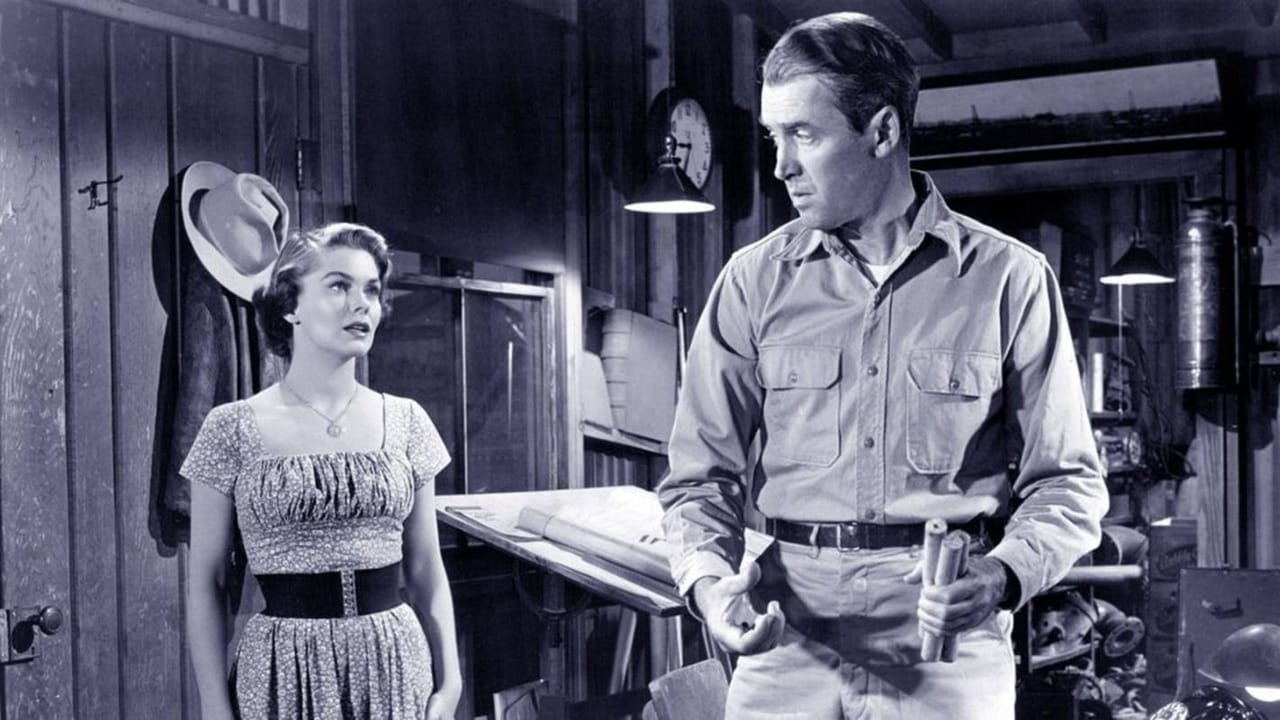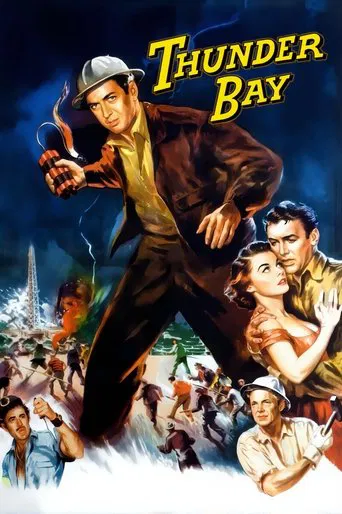

The posted comment about wanting to see the "widescreen" version needs to be addressed.As the listing for the film indicates, Thunder Bay was filmed with a standard Academy ratio of 1.37x1. That was the way it was meant to be shown. Universal then chopped off the top and bottom of the image - totally destroying the spatial integrity of the image - to claim that it was a "widescreen" film.It must have looked awful. Count yourself lucky you don't get to see it.(This horrible trick was also tried for the mid 1960s reissue for Gone With the Wind, where it was blown up to 70mm and released in a 2.35x1 ratio, which was just awful.)
... View MoreJimmy Stewart was directed by Anthony Mann in many wonderful Westerns--all made in the 1950s. They are classics--every one of them--ranging from WINCHESTER '73 to THE FAR COUNTRY to THE MAN FROM LARAMIE. However, they also made one non-Western together and this is that film. Considering the track record, I certainly expected so much more from this film. Instead of the usual high-caliber work, this film was amazingly flat and uninspiring despite having a very original story. I guess you can't win 'em all! Oddly, the film begins with Stewart and Dan Duryea as pals who are out to make a deal on an offshore oil rig. I say this is odd because usually, Duryea plays bad guys and NEVER buddies of the leading man. However, in this film he is a basically good guy--though he does have a hint of larceny about him! The oil rig is at first welcomed by the local shrimp boat operators. However, when they find that the oil company is using dynamite to help them detect oil deposits, they are afraid of losing their livelihoods and violently oppose the drilling. It is actually an interesting look at the 1950s, as Stewart is portrayed as the good guy and the dynamiting is explained away very glibly--saying it won't cause any lasting harm to the environment! As an avid fisherman, I didn't buy this explanation--nor did the shrimpers. But, the damage had already been done and the location for the well was determined quickly before the boat owners could do anything to stop this. The rest of the film follows the up and down relationship between the two factions until ultimately everyone is happy and the film ends--especially when they discover that the oil platforms are great attractants for sea life.The problem with all this is that while this might be modestly interesting from a historical sense, none of this seems compelling enough for a film. Plus, some of the characters in the film seem a bit stupid and tough to believe--apart from Duryea and Stewart. The film just seemed to lack energy or lasting appeal, though it was mildly diverting enough to merit a 6.
... View MoreThis was decent entertainment but nothing special, which it could have been with the likes of James Stewart, Joanne Dru, Dan Duryea and Gilbert Roland, and directed by Anthony Mann. This is supposed to be very good widescreen viewing but, unfortunately, I haven't viewed it on that format. We are all stuck with a formatted-to-TV tape until a DVD is released on this film. What's the holdup?Duryea and Stewart played their normal interesting roles. This is mainly storytelling, even though it's listed as an "action movie." Nobody gets killed, and there is very little violence and, of course, no profanity. It's simply a story of some people who are the first to successfully drill oil offshore and the resistance they get from the local fishermen.Dru mostly frowns through the picture, so she's not that likable as the female romantic lead. Stewart's squeaky voice doesn't across that well here, either. He sounded better on most of his other films. It's an okay movie but certainly not one I would watch frequently, but I would like to see this in its intended widescreen version.
... View MoreFrom the director/actor team that brought us many of the great westerns of the 1950s, Thunder Bay teams Anthony Mann and James Stewart in what could easily be called a modern western. Stewart plays Steve Martin, an oil driller with a dream. His goal is to build an off-shore drill in the Gulf of Mexico. He receives the financial backing of oil tycoon Kermit MacDonald (Jay C. Flippen) and begins work.He sets out from a small fishing community that has been on hard times lately. They are leery of Stewart and his partner Johnny Gambi (Dan Duryea) at first, and become more so when the two start blasting in the middle of their shrimp beds. To make matters worse, Johnny falls in love with a local girl who is already engaged to one of the fisherman.Tension builds as the fishermen continue to have bad luck and the drill progresses. One disgruntled fisherman attempts to blow up the drill platform during the middle of a hurricane. Stewart, who had stayed on the platform to see how it would withstand the storm, catches him just in time to save it. A slippery fight ensues, during which the fisherman and Stewart fight not only each other, but a constant onslaught of water. As in the typical western, the hero (Stewart) wins and the villain dies.The fight scene is one that dates the film. The special effects seem very archaic in wake of such recent films as Titanic and The Perfect Storm. Other than that, the film presents an interesting story on what, at the time, was a very taboo subject.Aware of the controversy the film would stir-up, the film was carefully crafted to prove that two industries could exist side by side. As the fishermen resolve to destroy the well, Stewart discovers that his well has uncovered a new bed a shrimp. When the fishermen learn this they decide that the well is indeed an asset to their community and all live happily ever after.As usual Stewart steals the film. His acting is subtle and believable. The simple story did not push him as an actor, but he is properly harried, tough and laconic. Overall this is an interesting film, enhanced by the beautiful location shots filmed in Technicolor by William Daniels. Truly, an intriguing and different take on the western genre.
... View More